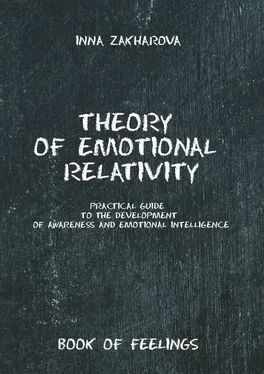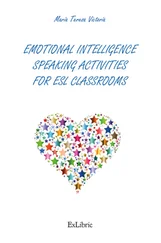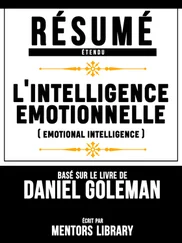1 ...6 7 8 10 11 12 ...20 That is why we want to have close people with whom we’ll have common values from a high priority list, everything else is not so important, there is always the opportunity to come to an agreement. When something very important does not coincide, when it is a value for one partner, and it is anti-value for the other one, it is impossible to go through disgust that arises, it will be so strong and create such a great distance that you can’t even start a relationship with this person.
For example, one person has a need for respect, and values of autonomy, independence are at a high level of priority, while the other one has a leading need for love, and communication, closeness is very important for him. If you don’t realize these differences and do not control your feelings, then the following situation may arise: when one strives for greater intimacy, the other will move away due to the feeling that his boundaries are violated and he loses autonomy. One calls the other 5 times a day, wanting to be closer, to be initiated into all the circumstances of the other’s life, and the other gets angry every time, because it looks completely different for him. It seems he is controlled by your partner and has to report about your working day every time, which means that he is losing his independence.
When we face anti-values, we have not only disgust, but also other emotions. If we are talking about the need for security, when we meet the anti-values of this need (lack of money, a situation of uncertainty, pressure, any direct danger), fearalways arises sharply. When we face anti-values of the need for love (ignoring, criticizing, condemning, humiliating), we feel shame. When faced anti-values of the need for respect (injustice, lack of obligation, weakness, lies, evasion, irresponsibility) a strong angerarises.
When the situation of meeting with anti-values has passed, we experience sadness or feelings that contain sorrow (resentment, guilt). It is explained by the fact that we did not get what we needed, besides we created a deficit for ourselves, made your own life even worse than it was. When we face any anti-values (pressure, ignoring, injustice, etc.), there is always the temptation to relieve ourselves of responsibility for what has happened and shift it to another person or to the situation as a whole. However, the sadness that inevitably arises in such cases always tells us: “Something, that YOU’ve done, haven’t led you to the result, you haven’t received or even lost your value”. A good understanding of yourself will be that you’ll understand what exactly valuable you wanted to get.
For example, you wrote an article and received a critical statement towards it: “It is dull, there is nothing in it that would attract the attention of the reader”. This criticism deeply hurt your heart. At the moment of this criticism, you are likely to feel shame (awkwardness), and then sadness (in its purest form or as part of resentment, guilt). What makes you so sad? What didn’t you get or lose? This is a question that needs to be answered within yourself. In this example, we are talking about a person with a leading need for attention. When such a person expresses himself creatively (writes an article), he is subconsciously motivated by the satisfaction of psychological needs – to receive praise, admiration, attention. But in the end, instead of them, he receives criticism that deprives the remnants of self-love. It hurts. Realizing such things, you should rethink your motivation and set a conscious goal for writing an article. For not just getting praise as a result of writing an article, but for expressing in it what is really important to you. And then you will get satisfaction from your work, and it won’t be important to you how it will be met by others. Thus, self-respect appears and when you find it, self-love will also become greater.
1. Calmness
When we meet the values that relate to the need for security (support, knowledge, financial resources), we feel joy, it seems to confirm: “You do everything right, go ahead, do it again.” If it comes to security, then joy will be in the form of calm, lightness, relaxation. When you are in your fortress, there are people around who will support you, you know and possess information, there is enough money in your account – you are calm.
Security + value = calmness
2. Pleasure
When we meet with values relating to the need for love (intimacy, communication, compliments, attractive appearance), we will also feel joy, but in this case it will be in the form of pleasure, enjoyment. When you look at a picture that you like, you feel pleasure, when you communicate with a person who you like, you feel enjoyment.
Acceptance, attention + value = pleasure
3. Satisfaction
When meeting with values that relate to the need for respect (strength, justice, integrity, honesty, responsibility), we feel joy in the form of satisfaction. When you see your cool results that required commitment, you feel deep satisfaction from the work done.
Respect +value = satisfaction
Let’s look at the table and find out what a person with the leading need for security wants to be eager for and what he wants to get rid of.
Security
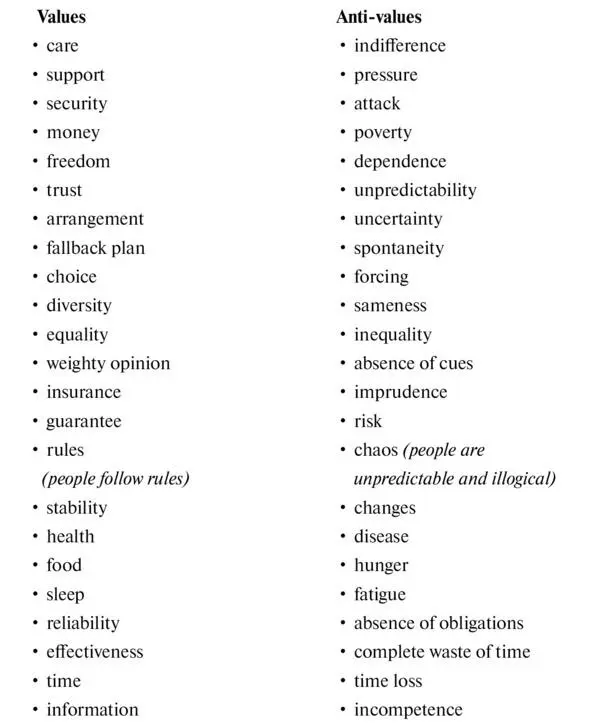

According to the list in the table, you can notice a values conflict, for example, stability and diversity, or care and freedom. Any diversity implies changes, except in situations when you, having diversity, choose the same. Care, however, implies a connection, and therefore, dependence on another person, and in this case, there can be no talk of complete freedom. There are special relationships with value rules. They are very necessary in order to understand how others should and will act, but I don’t want to act according to the rules myself, as this means a lack of choice and diversity, which are also values. When there are no rules, it’s also bad – chaos (anti-value) arises, you don’t know from whom and what to expect. It turns out that such people need rules and clear instructions, but they themselves violate them.
It turns out that a person with a leading need for security is often very controversial and indecisive, constantly doubting.
The list of values of a person with a leading need for love, acceptance, attention is given in the table below. There are practically no contradictions inside this table. With the exception of sincerityand image, often the image involves a certain embellished look. It turns out that a person with a leading need for love highly values sincerity, but does not want to show himself real.
Love
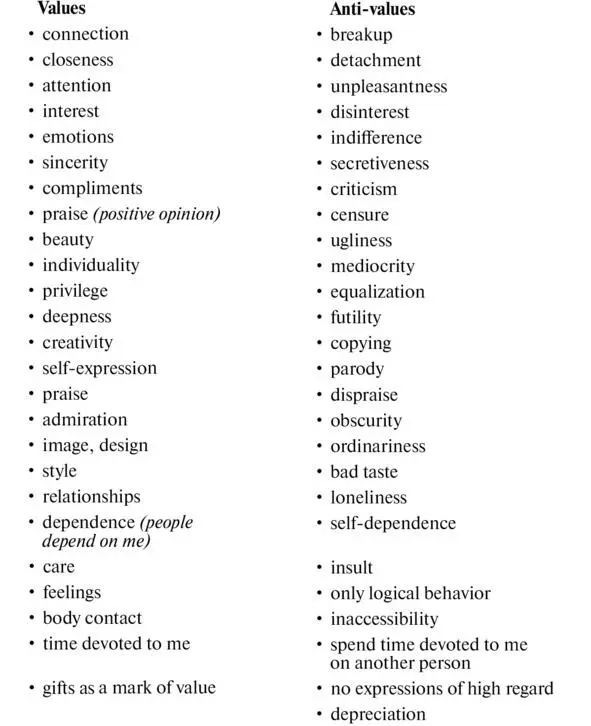
The third basic psychological need is respect. The values of a person with a leading need for respect are practically the opposite of the values of the need for love.
Respect
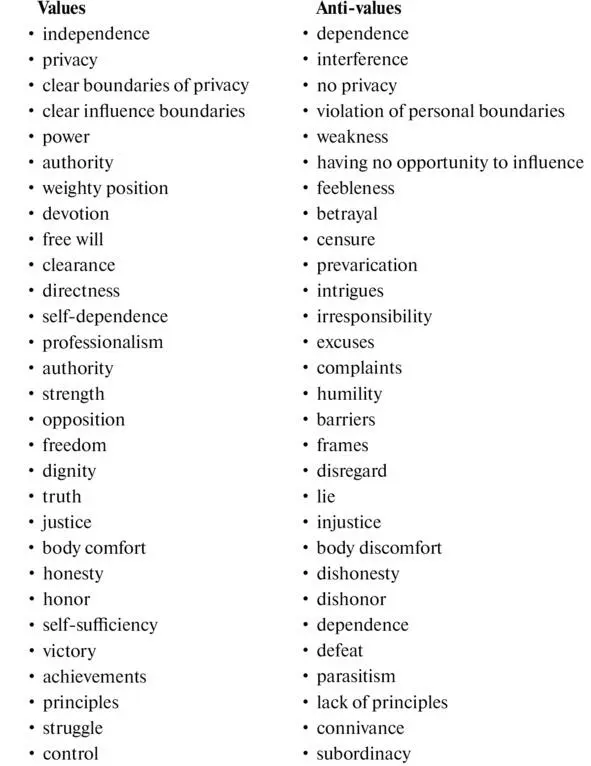
There are also practically no conflicts in this list, with the exception of a couple of justice and injustice. As justice is always subjective and is determined basically by systemic rules, it happens that, in an effort to restore justice, people with a leading need for respect are often not fair according to other people.
Читать дальше
